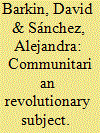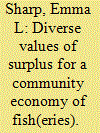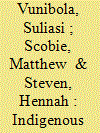| Srl | Item |
| 1 |
ID:
173444


|
|
|
|
|
| Summary/Abstract |
The hope for a unique revolutionary actor in the twentieth century evaporated as a result of the weaknesses of social organisations. This paper examines the potential of an almost-forgotten group of revolutionary actors – collectively organised and deliberately involved in processes of social and productive transformation with a legitimate claim to territory – whose present-day activities involve them in concerted processes to consolidate a different constellation of societies on the margins of the global capitalist system. Indigenous and peasant communities throughout the Americas are self-consciously restructuring their organisations and governance structures, taking control of territories they claimed for generations. They are also reorganising production to generate surplus, assembling their members to take advantage of underutilised resources and peoples’ energies for improving their ability to raise living standards and assure environmental conservation and restoration. These communities are not operating in isolation. They coordinate activities, share information and build alliances. Hundreds of millions of people are participating in this growing movement; they occupy much more than one-quarter of the world’s land area. There is great potential for others to join them, expanding from the substantial areas where they are already operational. Global social networks are ensuring that this dynamic accelerates.
|
|
|
|
|
|
|
|
|
|
|
|
|
|
|
|
| 2 |
ID:
185110


|
|
|
|
|
| Summary/Abstract |
This paper develops a diverse economies account of fish ‘waste’ that revalues it as ‘surplus’. We examine ‘Kai Ika’, a community marine conservation experiment in Tāmaki Makaurau (Auckland), Aotearoa New Zealand. Kai Ika rescues fish heads, frames and offal that were previously ‘going to waste’ and redistributes them to fish eaters who would otherwise struggle to access these foods. It involves fishers and community sector and Indigenous actors in an initiative that converts would-be waste into surplus. We examine the case as a diverse economic project that nourishes humans, enhances respect for fish as living beings, and potentially conserves marine resources in the face of global-to-local fisheries depletion. The research is based on community-gathered fish parts collection data, and virtual and email interview data. We analyse this data to produce an account of diverse ‘object values’ and fish-related surpluses that derive from surplus labour and other socio-cultural and environmental surplus. We argue that reframing fish economies in this way encourages new and diverse economic subjectivities and a more connected, relational and cooperative community economy of fish.
|
|
|
|
|
|
|
|
|
|
|
|
|
|
|
|
| 3 |
ID:
185109


|
|
|
|
|
| Summary/Abstract |
This study examines Indigenous Fijian and Papua New Guinean enterprises on customary land. It explores the duality of merging Indigenous and Western principles of entrepreneurship and the ability to balance business and socio-cultural imperatives. A qualitative, ethnographic-case study approach is deployed, with talanoa/tok stori used to collect empirical materials. Two interrelated themes emerged from the study: The need for Indigenous enterprise models to contribute to a more holistic conception of well-being, and as a result, the requirement to rethink how surplus is distributed beyond mainstream shareholder ownership models. This study reveals a more nuanced approach to distributing surplus based on Indigenous conceptions of kinship. The specific theoretical contribution of this study is an Indigenous conception of surplus distribution that offers a challenge to traditional shareholder models.
|
|
|
|
|
|
|
|
|
|
|
|
|
|
|
|
| 4 |
ID:
093396


|
|
|